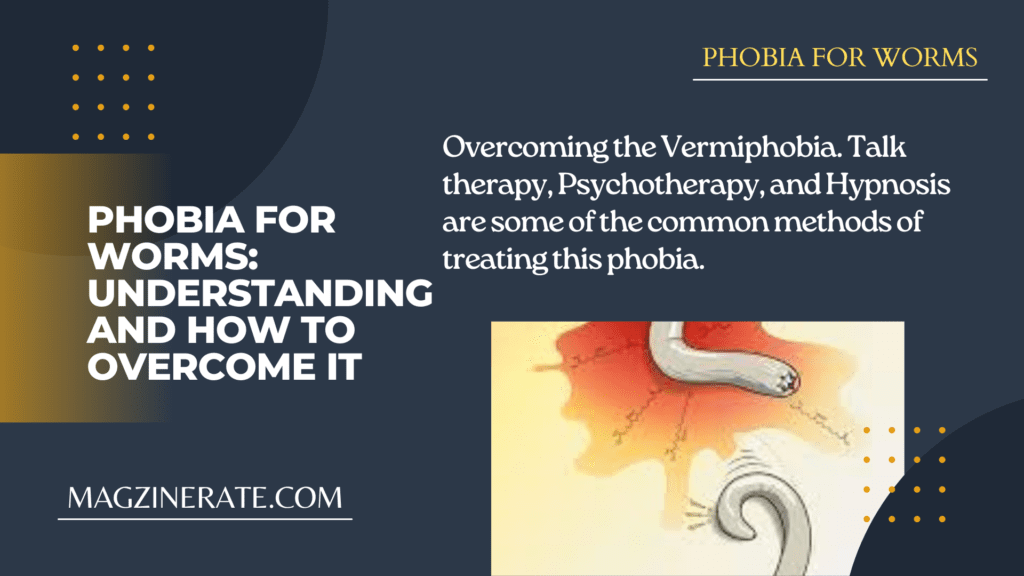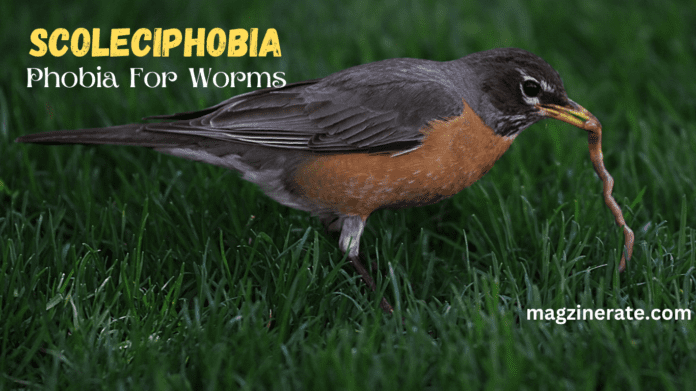Scoleciphobia, also known as vermiphobia, is an extreme phobia for worms. It is a specific phobia, an anxiety disorder characterized by an intense and irrational fear of one particular object or situation. People with Scoleciphobia may experience extreme anxiety or panic attacks when they see, think about, or even talk about worms.


Symptoms Of Phobia For Worms
The symptoms of phobia for worms can vary from person to person, but some common symptoms include:
- Intense anxiety or fear when seeing, thinking about, or even talking about worms
- Rapid heart rate
- Sweating
- Trembling
- Difficulty breathing
- Nausea or vomiting
- Dizziness
- Chest pain
- Feeling like you are going to pass out
- Avoiding situations where you might see or encounter worms
Causes Of Phobia For Worms
The exact cause of phobia for worms is unknown, but it is thought to be a combination of genetic and environmental factors. Individuals may exhibit varying susceptibility to phobia development, and specific events, like witnessing a close encounter with a worm or having negative interactions with these creatures, could trigger the onset of a phobia.
Treatment For Phobia For Worms
Several effective treatments for phobia for worms include cognitive-behavioral therapy (CBT) and exposure therapy. CBT can help people identify and challenge the negative thoughts and beliefs contributing to their fear. Exposure therapy involves gradually exposing people to the feared object or situation in a safe and controlled environment.
Coping With Phobia For Worms
If you have Scoleciphobia, there are several things you can do to cope with your fear, including:
- Educate yourself about worms. The more you know about worms, the less scary they may seem. Learn about the different types of worms, where they live, and what they do.
- Avoid situations where you might see or encounter worms. If you know that there is a place where worms are likely to be, try to avoid going there.
- Develop relaxation techniques. Relaxation techniques such as deep breathing and progressive muscle relaxation can help to reduce anxiety and panic.
- Talk to a therapist. A therapist can help you to develop a treatment plan for your Scoleciphobia.
Types Of Worms
There are many different types of worms, but some of the most common types that people with Scoleciphobia may fear include:
- Earthworms
- Nightcrawlers
- Angleworms
- Mealworms
- Roundworms
- Tapeworms
- Pinworms
- Hookworms
- Parasitic worms
Where Do Worms Live?
Worms can be found in a variety of habitats, including:
- Soil
- Water
- Compost piles
- Dead animals
- Human and animal feces
What Do Worms Do?
Worms play an essential role in the environment by breaking down organic matter and helping to aerate the soil. They are also a food source for many animals, including birds, fish, and frogs.
How to Reduce Your Exposure to Worms
If you have Scoleciphobia, there are a few things you can do to reduce your exposure to worms, including:
- Avoid gardening or working in the soil.
- Wear shoes outdoors, especially in areas where worms are likely present.
- Wash your hands thoroughly after working outdoors or handling any objects that may have been in contact with worms.
- Keep your home clean and free of pests.
When to Seek Professional Help
If your fear of worms is severe and interferes with your daily life, it is important to seek professional help. A therapist can help you understand your phobia and develop a treatment plan.
Personal Stories of Phobia For Worms
I’ve feared worms since I was a little kid. I remember when I was playing in the backyard, I saw a worm and started to scream and cry. My mom ran over to see what was wrong and laughed when she saw the worm. I was so embarrassed, but I couldn’t help it. I was terrified of worms.
My fear of worms improved as I got older, but it never completely disappeared. I still avoid them whenever possible, and if I do see one, I try not to panic. But it’s hard. Worms are just so disgusting and slimy.
FAQS
Q: What does vermiphobia mean?
Vermiphobia, an uncountable condition, refers to an abnormal or irrational dread of worms or the fear of being infested by them.
Q: What does chiroptophobia entail?
Chiroptophobia is characterized by an intense and irrational fear of bats, where merely encountering the word can act as a trigger for some individuals. This fear can manifest as intrusive and debilitating thoughts about these creatures, often culminating in severe anxiety and panic attacks.
Q: What is the fear of worms and centipedes called?
Individuals suffering from an irrational or heightened fear of worms are often called germaphobes. Vermiphobia belongs to the group of specific phobias specifically categorized under animal phobias. The typical method for managing vermiphobia involves cognitive-behavioral therapy (CBT) and exposure therapy.
Q: What does the term ‘Herpetophobia’ mean?
Herpetophobia is characterized by an overwhelming fear of reptiles, typically focusing on creatures such as snakes and lizards. It falls under the category of specific phobia, a type of anxiety disorder where individuals encounter extreme anxiety when confronted with the subject of their fear.
Q: What is the prevalence of Nyctophobia?
Nyctophobia, a prevalent fear, particularly in children, is estimated by some researchers to affect nearly 45% of children, with a significant prevalence of fear of darkness observed in kids aged 6 to 12.
Also, read our related article for more information. Click Here.


